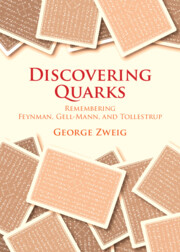Book contents
- Frontmatter
- Dedication
- Frontmatter
- Contents
- Preface
- 1 The Road to Quarks
- 2 The Discovery of Quarks
- 3 Alvin Virgil Tollestrup
- 4 Richard Phillips Feynman
- 5 Murray Gell-Mann
- 6 A Deeper Layer of Reality
- 7 Epilogue
- A A Primer on Quarks
- B The First CERN Report
- Glossary: A Guide for the Perplexed
- Acknowledgments
- Further Reading
- Bibliography
- Index
5 - Murray Gell-Mann
Published online by Cambridge University Press: 06 November 2025
- Frontmatter
- Dedication
- Frontmatter
- Contents
- Preface
- 1 The Road to Quarks
- 2 The Discovery of Quarks
- 3 Alvin Virgil Tollestrup
- 4 Richard Phillips Feynman
- 5 Murray Gell-Mann
- 6 A Deeper Layer of Reality
- 7 Epilogue
- A A Primer on Quarks
- B The First CERN Report
- Glossary: A Guide for the Perplexed
- Acknowledgments
- Further Reading
- Bibliography
- Index
Summary
Chapter 5 focuses on Murray Gell-Mann who dominated particle physics for more than a decade starting in the mid-1950s. His perspective, style, and major contributions to physics, while I knew him, are described. A comparison of Feynman and Gell-Mann’s views on how to practice physics, and what they valued concludes this chapter.
A succession of toy field theories of increasing generality are described, the final one, missing all strong interactions, is based on mathematical quarks from which equal-time commutation relations of the weak and electromagnetic currents are abstracted. The Eightfold way and the Gell-Mann—Okubo mass formula are discussed, and Gell-Mann’s view of quarks is described in some detail. Examples of a darker side -- his pattern of inadequate attribution, that I only fully realized while writing this book -- are also given.
Information
- Type
- Chapter
- Information
- Discovering QuarksRemembering Feynman, Gell-Mann, and Tollestrup, pp. 66 - 86Publisher: Cambridge University PressPrint publication year: 2025
Accessibility standard: Inaccessible, or known limited accessibility
Why this information is here
This section outlines the accessibility features of this content - including support for screen readers, full keyboard navigation and high-contrast display options. This may not be relevant for you.Accessibility Information
Content Navigation
Allows you to navigate directly to chapters, sections, or non‐text items through a linked table of contents, reducing the need for extensive scrolling.
Provides an interactive index, letting you go straight to where a term or subject appears in the text without manual searching.
